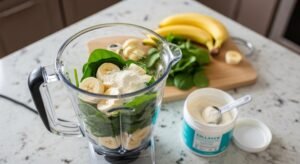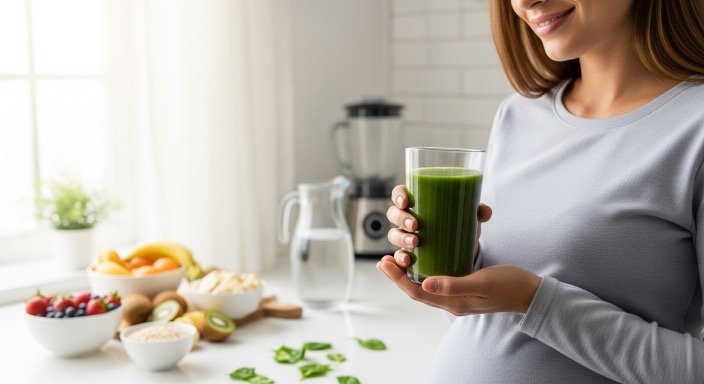Is Collagen Safe During Pregnancy
Pregnancy changes almost everything — your body, your energy, your skin, even the way you think about vitamins and supplements. And if you’ve been taking collagen powder or gummies before pregnancy, you may now be wondering:
“Is collagen safe during pregnancy?”
It’s a valid question — and a smart one. During pregnancy, every choice feels bigger because it’s not just about you anymore; it’s about your baby, your health, and your peace of mind.
The good news? You’re not alone. Many moms-to-be ask whether collagen supplements are safe while pregnant, and this guide breaks it all down in simple, clear language — without alarmism, without confusing medical jargon, and without guesswork.
Let’s dive into what science, nutrition experts, and doctors say, and how you can make informed, confident decisions.
Quick reminder: Always talk to your doctor or midwife before adding supplements during pregnancy. This guide is for education — not medical diagnosis or treatment.
What Is Collagen, and Why Do So Many Women Take It?
Collagen is a protein your body naturally produces. Think of it as the “glue” that holds everything together — skin, hair, nails, bones, joints, and connective tissue.
Most people take collagen supplements for:
- Skin elasticity
- Nail and hair growth
- Joint health
- Gut support
- Muscle recovery
- Anti-aging support
During pregnancy, when hormones shift and your body stretches in ways you didn’t think possible, collagen sounds like a dream addition to your routine.
But here’s the big question…
Is Collagen Safe During Pregnancy?
Short answer:
For most healthy pregnant women, collagen is generally considered safe, especially when it comes from food sources like bone broth, eggs, chicken, and fish.
However — and this is important — supplement form safety hasn’t been officially confirmed through large pregnancy-specific studies. That means we rely on nutritional guidelines, expert opinions, and safety logic.
Most OB-GYNs say collagen is likely fine, but recommend:
✔ Choosing clean, third-party-tested brands
✔ Avoiding herb-infused formulas marketed as “glow boosters”
✔ Reviewing ingredients with your doctor
Pregnancy rule: If in doubt, check it out with your doctor.
Why Do Pregnant Women Consider Collagen?
Pregnancy brings beauty — but also:
- Stretch marks
- Thinning hair
- Weaker nails
- Joint discomfort
- Increased protein needs
- Slower digestion
Collagen can help support skin elasticity, joint comfort, and protein intake, which makes it appealing during pregnancy.
And research shows collagen may support skin hydration and elasticity overall (external link below), which is useful when your belly is growing quickly.
However, it should never replace a balanced pregnancy diet — it’s a supplement, not a main protein source.
Benefits of Collagen in Pregnancy
Potential benefits include:
| Pregnancy Benefit | How Collagen Helps |
| Skin elasticity | Supports skin stretching and reduces dryness |
| Hair & nails | May support strength as hormones fluctuate |
| Protein support | Helps meet daily protein goals |
| Joint & pelvic support | Assists connective tissue and joint comfort |
| Postpartum recovery | Helps tissue healing after birth |
But remember: everyone is different. Supplements are not a shortcut, and your prenatal vitamin, whole foods, and hydration still matter most.
What Types of Collagen Are Typically Used?
Most supplements include:
- Collagen peptides (hydrolyzed collagen)
- Marine collagen (from fish)
- Bovine collagen (from cows)
- Eggshell membrane collagen
Pregnant women typically prefer hydrolyzed bovine or marine collagen because they are simple and widely studied.
Avoid blends with herbal boosters like ashwagandha, ginseng, or adaptogens — many herbs are not recommended during pregnancy.
Is There Research on Collagen and Pregnancy?
Here’s the truth:
There are no large clinical trials specifically testing collagen supplements in pregnant women.
But there is research showing collagen supports skin elasticity and connective tissue in general populations. One peer-reviewed study found that collagen peptides improved skin hydration and elasticity in healthy women.
So while collagen is not harmful by design, pregnancy safety guidelines still lean toward caution.
How Much Collagen Can You Take While Pregnant?
There is no official pregnancy dosage guideline.
Typical collagen servings range from 5g – 15g daily, but only your healthcare provider can recommend the right amount.
If approved by your doctor, many moms-to-be start with 5–10g per day.
Food Sources of Collagen (Natural & Pregnancy-Safe)
Is Collagen Safe During Pregnancy

Is Collagen Safe During Pregnancy
Whole-food collagen options include:
- Bone broth
- Chicken skin
- Fish skin
- Eggs
- Beef and poultry
- Gelatin-based foods
These provide not just collagen — but minerals, amino acids, and warmth-for-the-soul nourishment (hello, cozy soup evenings ).
Want to DIY a pregnancy-friendly protein boost?
Try this quick collagen smoothie:
Pregnancy-Friendly Glow Smoothie
- 1 cup almond milk or oat milk
- 1 banana
- 1 scoop plain collagen peptides
- 1 tablespoon chia seeds
- Handful of spinach
- 1 teaspoon honey (optional)
Blend and sip — delicious, gentle on digestion, and nourishing.
Is Collagen Safe During Pregnancy

Is Collagen Safe During Pregnancy
When Collagen May NOT Be Safe in Pregnancy
Avoid collagen supplements if:
-They contain herbs not approved for pregnancy
-They include artificial sweeteners you’re sensitive to
-You have a known allergy to fish, eggs, or beef ingredients
-Your doctor advises against supplements
Also, if you experience:
- Nausea
- Stomach upset
- Bloating
- Allergic reaction signs
Stop and check in with your clinician.
As your belly grows, protein demands rise — and so does the need for gentle gut support.
According to the Cleveland Clinic, most collagen supplements are considered safe for adults, but individual tolerance varies and supplements aren’t regulated like medications. Pair that with pregnancy-specific caution and it becomes even more crucial to discuss with your doctor.
A Harvard Health Publishing review also highlights that collagen helps maintain skin elasticity and connective tissue, which may explain why so many women consider it during pregnancy.
Final Thought: So, Is Collagen Safe During Pregnancy?
Collagen during pregnancy isn’t a simple yes-or-no. But here’s what we do know:
- Food-based collagen is safe
- Plain collagen peptides are likely safe for most women
- Products with herbs or additives should be avoided
- Always talk to your doctor first
If your OB-GYN gives the green light, collagen can be a gentle way to support skin, joints, and protein needs — without extreme ingredients or trendy claims.
Pregnancy is a chapter where you’re already doing so much right. Asking questions like this proves your dedication and thoughtfulness.
You’re growing life. You’re learning. You’re protecting yourself and your baby — and that’s powerful.
More women health articles? click here







